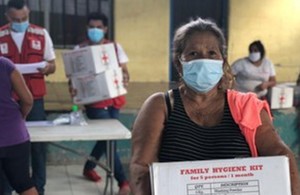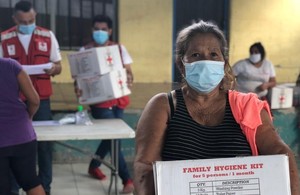Apoyo extra del Reino Unido frente a huracanes en Centroamérica
Press release
El Reino Unido proporciona un kit de suministros básicos para desastres, que incluye refugio temporal, alimentos y saneamiento, además de 1 millón de libras para la Cruz Roja.

- El Reino Unido proporciona un kit de suministros básicos para desastres, que incluye refugio temporal, alimentos y saneamiento, además de 1 millón de libras para la Cruz Roja
- El buque Angus de la Real Flota Auxiliar llega a las costas de Honduras para ayudar en las tareas de auxilio
- La costa del Caribe es golpeada por un segundo huracán, provocando que millones de personas requieran ayuda urgente
El Reino Unido está proporcionando de forma urgente suministros humanitarios esenciales y 1 millón de libras al llamado de emergencia de la Federación Internacional de Sociedades de la Cruz Roja y de la Media Luna Roja (IFRC) para ayudar a las personas en Centroamérica que han sido golpeadas por los catastróficos huracanes recientes.
Los países de América Central han sido azotados por el Huracán Iota, pocos días después de que el Huracán Eta impactara el mismo tramo de costa, causando graves daños e inundaciones. Las comunidades vulnerables en Nicaragua, Honduras y Guatemala, así como partes de Belice, El Salvador, México, Costa Rica, Colombia y Panamá se han visto afectadas, y se cuenta con informes que indican que más de 5 millones de personas se han visto afectadas en toda la región. Se informa también que más de 160 personas han muerto y mucha más gente en toda la región se ha visto obligada a evacuar sus hogares.
El Reino Unido provee:
- 1 millón de libras para el llamado de emergencia de la Federación Internacional, que proporcionará refugio, sustento, servicios de salud y agua potable, así como productos de saneamiento e higiene;
- 2,000 lonas impermeables; 1,000 cajas de herramientas para ayudar a proporcionar refugio de emergencia, 1,000 equipos para cocinar y 900 kits de limpieza para los más necesitados, que distribuirá la Cruz Roja;
- Apoyo a organizaciones de beneficencia que trabajan en la región a través del Fondo START;
- Ayuda mediante el despliegue del buque Angus de la Real Flota Auxiliar, que está apoyando los esfuerzos de auxilio militar de Estados Unidos en Honduras.
La Ministra para Europa y las Américas del Ministerio de Asuntos Exteriores, Mancomunidad y Desarrollo (FCDO), Wendy Morton, dijo:
El impacto de estos huracanes ha sido devastador, especialmente porque la misma región ha sido golpeada dos veces en cuestión de semanas. Nuestros pensamientos están con aquellos que han perdido a sus seres queridos y sus hogares.
El Reino Unido está incrementando su apoyo para ayudar a los necesitados a través de nuestra asistencia humanitaria y militar, proporcionando refugio, agua potable y medicamentos que salvan vidas a las personas que se encuentran esperando ayuda.
Notas para editores:
Este apoyo es parte de la asistencia del Reino Unido confirmada el viernes 13 de noviembre. Lee mas aquí.
Published 18 November 2020

